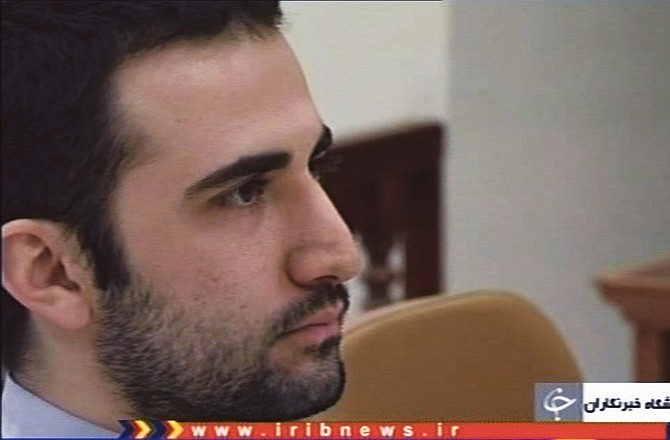TEHRAN, Iran (AP) - A former U.S. Marine interpreter arrested while on a trip to visit his Iranian grandmothers has been sentenced to death as a CIA spy, state radio reported Monday, in a case likely to become a new flashpoint in the escalating tensions between Tehran's defiance over its nuclear program and Washington's efforts to impose more crippling sanctions.
It was the first time an American citizen has been sentenced to death in Iran since the 1979 Islamic Revolution, according to the International Campaign for Human Rights in Iran.
"We are seriously concerned regarding the death sentence, secrecy, and continued lack of transparency surrounding the prosecution," said Hadi Ghaemi, a spokesman for the New York-based group.
The espionage charges against Arizona-born Amir Mirzaei Hekmati were similar to previous prosecutions against Americans who were sentenced to jail time and later freed, including an Iranian-American journalist in 2009 and three U.S. citizens detained along the Iraq border. Iranian prosecutors, however, had stressed Hekmati's links to the U.S. military in calling for capital punishment.
In Washington, the Obama administration denied on Monday that an American man sentenced to death in Iran was a CIA spy, and sharply criticized the Islamic republic in Tehran for what it called a pattern of arresting innocent people for political reasons.
White House spokesman Tommy Vietor said officials were still trying to learn the details of the sentence against Amir Mirzaei Hekmati. If true, the U.S. would condemn the verdict, he said.
"Allegations that Mr. Hekmati either worked for, or was sent to Iran by the CIA are false," Vietor said in a statement. "The Iranian regime has a history of falsely accusing people of being spies, of eliciting forced confessions, and of holding innocent Americans for political reasons."
Regardless of the facts of the case, Iranian officials may now see Hekmati as a potential bargaining chip in efforts to fend off tighter U.S.-led sanctions that could undercut Iran's oil industry.
Iran has recently ramped up its warnings about U.S. economic pressures and military involvement in the region, including threatening to use warships to close off vital oil tanker traffic in the Gulf and displaying a captured CIA surveillance drone last month as evidence of what it called covert plots by Washington.
Swiss diplomats - who represent the U.S. interests in Iran because Washington and Tehran have no diplomatic relations - have tried unsuccessfully to gain access to Hekmati, who graduated from high school in Michigan. Hekmati claims dual citizenship, but Iran considers anyone born to an Iranian father to be a citizen solely of the Islamic Republic.
Hekmati's mother, Behnaz, said she and her husband Ali - a professor at a community college in Flint, Michigan - were "shocked and terrified" by the conviction and death sentence.
Iran has often claimed it has detained foreign spies, but few details ever emerge. Hekmati's case stood out as a high-profile propaganda tool for Iranian authorities.
Iran claims Hekmati received special training and served at U.S. military bases in Iraq and Afghanistan before heading to Iran for his alleged intelligence mission.
In a statement released the same day, the Intelligence Ministry said its agents identified Hekmati before his arrival in Iran, at Bagram Air Field in neighboring Afghanistan. Bagram is the main base for American and other international forces outside Kabul, the Afghan capital.
The Iranian radio report did not say when the verdict was issued. Under Iranian law, he has 20 days to appeal.

